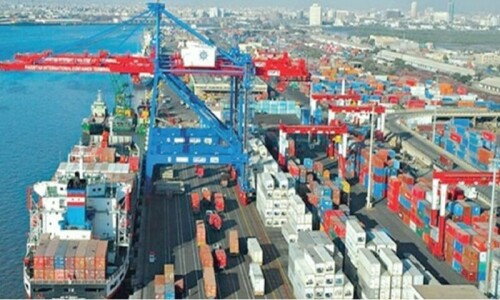• Drops 79pc to $681m in FY24 from $3.275bn a year go
• June sees $329m deficit, year’s second-highest

KARACHI: The previous fiscal year witnessed a significant reduction in the country’s current account deficit (CAD), with a sharp decline of 79 per cent compared to the previous year, marking the lowest deficit in 13 years.
According to the State Bank’s data released on Friday, the CAD dropped to $681 million from $3.275 billion in FY23.
Financial experts hail this as a major achievement for the government amid numerous economic challenges. “The current account deficit for FY24 stands at $681m, the lowest in 13 years,” said Tahir Abbas, head of research at Arif Habib Ltd.
Despite the overall improvement, the last month of FY24, June, recorded a deficit of $329m, following a deficit of $284m in May, which came after three months of surpluses. The current account showed a surplus of $490m in June 2023.
“This significant decline was driven by a 6pc reduction in the trade deficit and an 11pc increase in remittances,” Mr Abbas said.
Exports of goods in the previous fiscal year amounted to $31.09bn, up from $27.88bn in FY23, while exports of services increased slightly to $7.8bn from $7.59bn. Imports of goods were $53.17bn, and imports of services totalled $10.12bn.
The State Bank reported a trade deficit of $22.08bn in goods and $2.31bn in services for FY24, compared to a $1bn deficit in services in FY23.
Export growth in FY24 was 11.5pc, a significant recovery from the 14.2pc decline in FY23. Import growth was minimal at 0.9pc, following a 26.3pc decline a year ago.
Financial experts believe the current account deficit may remain low in FY25 if the government maintains strict control over imports and boosts remittances. However, they caution that rising business costs, including increasing electricity prices, high interest rates and new taxes on export income, pose significant challenges to export growth.
Exporters have expressed dissatisfaction with current economic policies, citing these issues in meetings with the finance minister and public appeals.
The economic contraction in FY23 due to lower imports is likely to persist, with FY24’s growth rate barely reaching 2.4pc.
The International Monetary Fund projects a 3.5pc growth rate for Pakistan in FY25, while Fitch Ratings forecasts a 3.2pc growth rate.
Published in Dawn, July 20th, 2024














































Dear visitor, the comments section is undergoing an overhaul and will return soon.